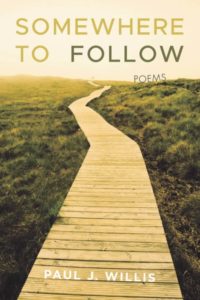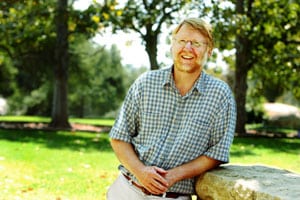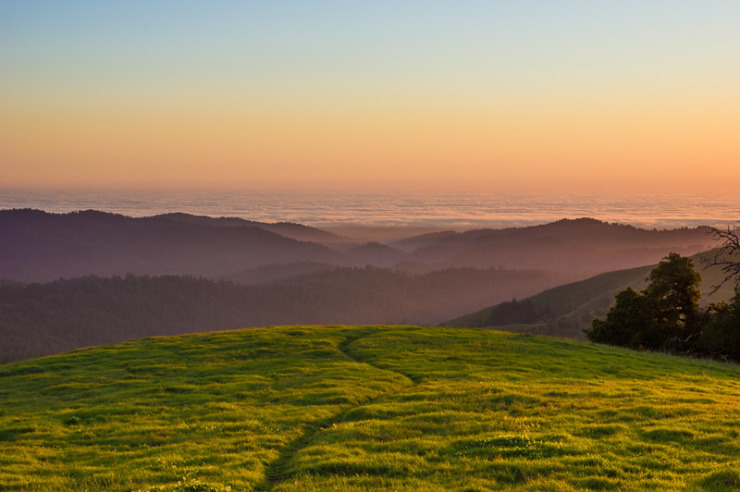Paul Willis and the Sense of the Sacred
Poet Paul Willis sees life’s everyday, usually-passed-over-without-a-second-thought events, and he finds the sacred. It might be that scouting jamboree where you sit around a campfire singing “On Top of Old Smokey.” Or a football player helping a tackled opponent to stand. Or young boys digging a hole in an empty lot because, well, they need to dig a hole. Or trimming back a tree grown too close to a building. Or hitchhiking a ride back to college, and only years later realizing that you spent a short time with a man who barely survived the Battle of the Bulge.
The sacred can surprise you, and it usually does. And it often surprises you years later, because sometimes you see the sacred only long after you experience it.
Somewhere to Follow is Willis’s new poetry collection. It’s filled with poems that tell stories of youth, of young adulthood, of family, of professional life, and of walking and hiking in Yosemite National Park. He writes with awareness of his own limitations and a wry sense of humor. He depicts setting concisely and vividly, inviting the reader to sit or walk next to him as his story unfolds. And the reader experiences a “Eureka!” moment at the same time as the poet.
Professional Development

a visiting assistant professor.
And my own office—or half of one—
in a stately red-brick edifice
with a white wooden cupola,
looking out on the autumn hills.
And I, at my desk, lavishing
a freshman essay with comment
after helpful comment, like
so many leaves coming to rest
upon the margins of each thought.
That is when my mentor, the poet,
looked over my shoulder and said,
“Son, you’re putting chrome
wheels on a manure spreader.”
What is more everyday than an English teacher grading a student’s essay? What could be more earnest than a new college professor showering an essay with helpful comments, like “so many leaves coming to rest / upon the margins of each thought”? And what is more revealing than the moment of truth when you realize that all of your helpful notes, which you’re laboring upon so intently, will not change the course of world literature and will likely be ignored by the student who only wants to know what grade you’ve given the essay? The poem doesn’t invite you to become cynical; instead, it tells you to take a deep breath and put what you’re doing in perspective.

Paul Willis
Willis offers many poems about what is clearly a favorite natural spot, Yosemite National Park in California. Yet it was a poem about another natural spot, the Frio River in Texas, that I found personally striking, because I’ve stood in the very spot Willis is standing when he sees that “bleed of green / below the rim of a limestone canyon.”
Willis, a professor of English at Westmont College in Santa Barbara, California, has previously published six poetry collections. Four of his poems have been nominated for the Pushcart Prize, and his poetry has been published in numerous literary magazines and anthologies, including The Best American Poems. He is co-editor of the anthology In a Fine Frenzy: Poets Respond to Shakespeare; the author of The Alpine Tales, an eco-fantasy omnibus comprising four novels; a young adult novel, All in a Garden Green; and two collections of essays. Willis is also a former poet laureate of Santa Barbara.
It’s difficult to identify a favorite in Somewhere to Follow, because you could pick any of its 75 poems and be content with your choice. All of the poems ring true. They celebrate the sacred, and they encourage us to find the sacred in our own lives and in our own memories. And be assured, you will find the sacred if you look for it.
Photo by Yugen, Creative Commons, via Flickr. Post by Glynn Young.
How to Read a Poem uses images like the mouse, the hive, the switch (from the Billy Collins poem)—to guide readers into new ways of understanding poems. Anthology included.
“I require all our incoming poetry students—in the MFA I direct—to buy and read this book.”
—Jeanetta Calhoun Mish
- Longfellow’s “Paul Revere’s Ride”: Creating a National Legend - April 17, 2025
- Poets and Poems: Katie Kalisz and “Flu Season” - April 15, 2025
- Poets and Poems: Michelle Ortega and “When You Ask Me, Why Paris?” - April 10, 2025


Katie Brewster says
Glynn,
Thank you for this review. I’m looking forward to getting my hands on Somewhere to Follow.
Didn’t see that ending line coming in “Professional Development,” but I laughed out loud.
Gratefully,
Katie
Glynn says
Katie, “Somewhere to Follow” is one of my Top 3 poetry collections read so far this year. Many of the poems have that surprising twist.
L.L. Barkat says
This, I really liked: “sometimes you see the sacred only long after you experience it.”
So very true. I wonder how our lives would change (or not) if we saw the sacred while we were experiencing it?
Bethany R. says
I love that paragraph too, Glynn. 🙂
L.L, I like your question. Makes me wonder too, is always possible to see the sacred in the moment? And if not, why not? What changes over time?